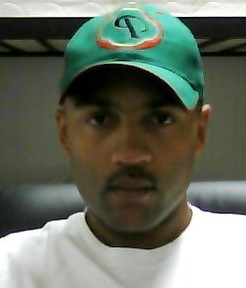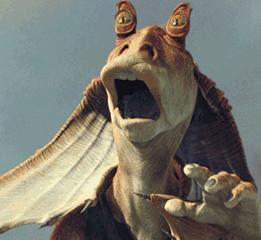This is the third interview and the fifth post in my series on inclusivity and exclusivity in fiction. You can find a full list of other posts so far at the end of this piece.
Today’s interview is with James Beamon, a writer of fantasy and science fiction short stories that often tackle questions of race and economic class in the midst of humor and wonders.
LUC: In a blog post of yours last year, you asked a question I’ve been hearing more and more about science fiction lately, in your case especially SF movies and TV series: Where are all the black people? You answer this question in part with some of your own stories, but your characters span not only a variety of races, but also social and economic classes and other groups that are often missing from fiction. Two examples that spring to mind are a convict and a young man with a severe stutter. Your characters sometimes struggle with questions like how they’re going to eat or how they can get around disabilities and prejudices to do things other people take for granted. How conscious is the way you choose your characters and the groups to which they belong, and do you have any specific hopes for how your work will affect readers and/or other writers?

JAMES: Sometimes I choose a character with the active intent to highlight racial issues and prejudices. Such was the case in “Orc Legal,” the second story in my 7 Realms series, which was always the writing outlet I used to deal with preconceived notions latent in high fantasy. Honestly, I’m not sure if Tolkien understood what he was doing with Middle Earth, I’m not going to sit here speaking on his intent, but if anything comes close to a master race, it’s his damned elves. They’re all tall and lithe and have 2% body fat and are acne free and will never ever age … what they wear is always in fashion, plus the clothes are enchanted with their elvish magic to glow at night and really highlight their angular sex appeal. Meanwhile, the brownest dudes around are either the mud-covered orcs or the human mercenaries working for the greatest evil the world has ever known. Oh, and the elves are all white. Sure, there are dark elves in high fantasy, but they stereotypically live in caves and plot murder and make poisons and other dastardly crap befitting a dark race.
I make it a point in the 7 Realms stories to see the world through the disenfranchised races … goblins and orcs and trolls. And while I don’t profess to make them noble (after all, the orc in “Orc Legal” is a career criminal in prison) I make them engaging, believable entities, with goals and desires that make them transcend one dimension. More importantly, I strive to have my audience laugh at the absurdities inherent in racial disparity while destroying preconceived notions. If I can break preconceived racist notions in high fantasy (e.g. … all orcs are dumb, all elves are beautifully perfect) then I believe it’s a step to realigning how people view the world around them. That’s what stories do … highlight the human condition. Besides, it’s extremely therapeutic for me to make fun of those stupid elves.
Again, sometimes I choose the character with my intent active and known. Sometimes the character chooses me to tell the story. That was the case with Mums in “The Homeless Man of Greater Zimbabwe.” I was completely swept up with notions of this lost and rediscovered city in the highlands of Africa, I saw it as a trade hub, a multicultural place where anyone could come. And while I wish I could claim genius or some sort of insight to why Mums came with a disability, he showed up at my door as he was … the homeless man. Ironically, he always spoke to me with a severe stutter. His problem arose out of that. This story was a chance to show readers a forgotten world with characters they could invest in who are active members of this lost culture. If the reader comes away feeling like it was possible, or with a deeper appreciation for what could have been, I will feel like I gave the place a decent tribute.
LUC: Come to think of it, that was one the things I found most startling and thought-provoking in “Orc Legal”: the elf-busting. I honestly hadn’t thought much about it before, but it’s true that elves seem to symbolize a version of white people that is especially pure and pretty and shiny. I know there are examples of stories and media that handle elves differently, but I’m talking mainly about the elf stereotype in and after The Lord of the Rings. In “Orc Legal,” you raise a topic that I haven’t come across so much in discussions of inclusivity and fiction, namely bringing some kinds of characters down out of the stratosphere. Inclusion is one thing, but how important is it to break down or redefine some of the groups that have tended to dominate Western, English-language fiction?
JAMES: Inclusivity really doesn’t mean much without equal footing. Again, with Tolkien as an example, it doesn’t matter if there are a thousand black people in the novels if they’re all in dark armor working for the evil overlord. Even if they chose different career options, in the Rings universe no matter what they strive for they will never attain the seemingly unassailable awesome inherent with being a fair elf. Extending this to the real world, to people who like to imagine and cosplay, and to young readers, all a white person has to do to attain a seemingly ideal state is stick on some ears. What’s that say for non-whites? Because ears aren’t gonna cut it. You get to be the orc or at best the dark elf.
That’s why I make it a point to elf bash, because it causes a re-evaluation. Instead of seeing perfection you see human foibles … elvish disdain and discrimation towards other races, vanity, an empty pursuit of perfection, qualities that aren’t attractive. If stories like Orc Legal, which makes an orc look smart and savvy and fun to be around while making elves petty and vain and pretentious, how much more does that idea of all races have something to offer permeate to the reader?
I think it’s a start if nothing else. The alternative is the mono-race syndrome that’s prevalent in both fantasy and science fiction, where everyone in the culture is the exact same way. When was the last time you saw a clean-shaven dwarf reading a book thoughtfully? How about a Klingon holding a piece of chalk scratching out mathematical theorems on a chalkboard that left Data astounded? The problem with mono-culture is that eventually writers start associating known stereotypes onto their created races.

You remember Star Wars Episode I, and how the trading Neimoidians all talked with a funny accent, mispronounced their “l” and “r”, and wore Far Eastern inspired clothing … it wasn’t hard to associate them with a present day non-white culture based on stupid stereotypes. I know I couldn’t stand that bastard Jar-Jar Binks … aka alien Stepinfetchit. Again, including all races and cultures in fantasy and science fiction is important, but not merely as extras, sword fodder for the white hero, thinly disguised stereotypes, or backup dancers. Inclusivity means more than a medieval eurocentric experience in fantasy with the one black Moor or Eastern trader as a sidekick. It means more than one non-white on the bridge of the starship. It means the ability to see good things and bad in all races, even when those races aren’t human.
LUC: I don’t think I’m alone in saying I’m with you on the Jar-Jar thing especially. If only they would have left the stupid racial stereotypes out of those movies, we could have spent our attention in the more rewarding pursuit of deriding the terrible plot.
I guess that isn’t, properly speaking, a question, so let me change gears and ask you this: How do the issues change when we take up the issue of economic class? Poorer people are badly underrepresented in most fantasy and SF too-but not in your fiction. In some of your stories, getting something decent to eat not only shows up, but it’s central to the plot in the same way that it’s central to the lives of millions or billions of people in real life. Are the problems and solutions the same for economic class as they are for race?
JAMES: I do believe racial and economic exclusion exists in fiction for some of the same reasons, predominately in that writers write what they relate to. One of the reasons you see a huge glut of white protagonists having adventures in euro-centric worlds in science fiction and fantasy is because many of the writers of speculative fiction are white people with euro-centric upbringings. I believe this same type of self-projection happens on an economic level as well … it’s kind of hard to write poverty when you’ve only seen it at a distance. I’m like Steve Martin in The Jerk … I started life as a poor black child. I know what government cheese tastes like. I remember Christmases where the only presents came from Oasis (a kind of Salvation Army where richer people donated toys). So while I can relate to the point where it appears convincingly in my writing, I don’t think this is a common thing for most writers.
Writing’s not necessarily expensive, like say golf or mountain biking, but it is an educated game. I can’t speak for all poor kids, but I know I had to work against my conditions to become fairly proficient at writing. A lot of it was self-education by reading voraciously and walking a lot to the library. The rest was paying attention in school, wanting good grades and all. People tend to flow like water and electricity … they take the path of least resistance, and in my hood this was definitely not a resistance free path … There were a lot of single parents who was always away from home working where I grew up, either that or they weren’t very proactive in their kids’ lives, and few kids will pick up a book if left to their own devices unless parents spend those first formative years helping that child foster a love for books. Luckily my mother helped foster that early love of fiction, so I was looking for books for an easy escape to places I couldn’t go. That love of reading germinated and grew into a love of writing, something I think virtually all writers share.

So this long, auto-biographical answer relates to why you don’t see more poor folk in fiction, but that doesn’t provide any solutions, does it? Given my stated cause for this lack of representation, a lack of author experience, I’m sure I don’t like the obvious answer… which seems to suggest having more writers who could relate to poverty. I’d rather there’d be less poor people and writers in a post-modern world are forced to guess what it’s like to get that government ration of peanut butter that just has bold, black “PEANUT BUTTER” stamped across the packaging and loving that hard, poor-grade ration because you don’t really have any basis for comparison, this being the only peanut butter you’ve ever had. Since quality fiction has a way of inspiring readers, and inspired readers grow to love writing themselves, I see a clever author who either had to unfortunately grow up poor or is awesome at extrapolating poverty being able to paint a realistic picture that inspires future writers to reach outside of their own experiences to write on both races they don’t belong to and socioeconomic conditions that they’ve never experienced. That’s the ideal solution… because its not writing from experience unless that experience involves private jets and the playboy mansion.
LUC: Any comments, answers to questions I haven’t asked, or closing statements?
JAMES: I don’t have any particularly insightful parting words … no last inspired nuggets of profoundness for your readers. Just like we all hail from different backgrounds and cultures to come together to live, work and play in today’s global village, I’m sure the issues you’ve put to all the writers you’ve interviewed will come together to make for a bigger, more profound understanding than I could ever state alone. That’s what makes inclusion so awesome.
Wait … were those particularly insightful parting words?
Posts so far in this series
- 7/27 – interview with Leah Bobet
- 7/29 - Where Are the Female Villains?
- 8/3 – interview with Vylar Kaftan
- 8/9 - Concerns and Obstacles (multiple mini-interviews)


